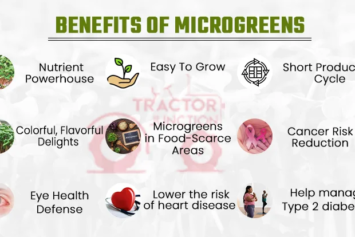Your cart is currently empty!

Top fruit smoothie ingredients
Microgreens, the tiny, vibrant shoots of vegetables and herbs, have been steadily gaining popularity in the health and culinary worlds. Often referred to as “vegetable confetti,” these small but mighty plants pack a powerful punch when it comes to nutrition and flavor. In this blog, we’ll explore what microgreens are, their health benefits, and how you can incorporate them into your diet for a nutrient boost.
These tiny greens can be grown from many different types of seeds and are typically ready to harvest within 7-21 days, making them an easy and quick option for fresh, homegrown nutrition.
Nutritional Composition of Microgreens
Despite their small size, microgreens are packed with nutrients. In fact, research has shown that they can contain up to 40 times more nutrients than their mature counterparts. Here is a detailed look at their nutritional composition:
- Vitamins
- Vitamin C: Essential for the growth and repair of tissues in all parts of your body.
- Vitamin E: An antioxidant that helps protect cells from damage.
- Vitamin K: Important for blood clotting and bone health.
- Vitamin A: Vital for vision, immune function, and skin health.
- B Vitamins: Including B1 (thiamine), B2 (riboflavin), B3 (niacin), B6, and B9 (folate) which are important for energy production and brain function.
- Minerals
- Potassium: Crucial for heart function and plays a key role in skeletal and smooth muscle contraction.
- Iron: Necessary for the production of hemoglobin and red blood cells.
- Zinc: Supports immune function and wound healing.
- Magnesium: Involved in over 300 biochemical reactions in the body including muscle and nerve function.
- Calcium: Essential for healthy bones and teeth, and also plays a role in blood clotting and muscle contraction.
- Antioxidants
- Carotenoids: Including beta-carotene, lutein, and zeaxanthin which are important for eye health.
- Phenolic Compounds: Such as flavonoids and polyphenols which have anti-inflammatory and anti-cancer properties.
- Amino Acids
- Essential Amino Acids: Including lysine, methionine, and tryptophan which are crucial for protein synthesis and various metabolic processes.
- Other Nutrients
- Chlorophyll: Known for its detoxifying properties.
- Fiber: Aids in digestion and helps maintain a healthy gut microbiome.
Health Benefits of Microgreens
The dense nutritional profile of microgreens translates into several comprehensive health benefits:
- Cardiovascular Health
- Antioxidants: Reduce oxidative stress and inflammation, lowering the risk of heart disease.
- Fiber: Helps lower cholesterol levels and maintain healthy blood pressure.
- Digestive Health
- Fiber: Aids in digestion, prevents constipation, and supports a healthy gut microbiome.
- Enzymes: Present in raw microgreens can help in the digestion of food.
- Immune System Support
- Vitamins and Minerals: Boost immune function and help the body fight off infections and illnesses.
- Antimicrobial Properties: Some microgreens like radish have natural antimicrobial properties.
- Weight Management
- Low Calorie, High Nutrient: They are low in calories but high in nutrients, helping you feel full and satisfied without adding extra calories.
- Metabolism Boost: The presence of B vitamins aids in energy production and metabolism.
- Skin Health
- Vitamin E and C: Protect the skin from oxidative damage and promote collagen production.
- Beta-Carotene: Converts to vitamin A, which is essential for healthy skin.
- Bone Health
- Calcium and Vitamin K: Crucial for bone strength and preventing osteoporosis.
- Magnesium: Works with calcium to support healthy bones.
- Eye Health
- Lutein and Zeaxanthin: Reduce the risk of age-related macular degeneration and cataracts.
- Vitamin A: Essential for good vision and overall eye health.
- Anti-Cancer Properties
- Phytochemicals: Such as sulforaphane in broccoli microgreens, have been shown to have anti-cancer properties.
- Antioxidants: Help prevent the mutation of cells and reduce the risk of cancer.
- Anti-Inflammatory Effects
- Polyphenols and Flavonoids: Have natural anti-inflammatory properties which can help reduce the risk of chronic diseases such as arthritis.

Leave a Reply